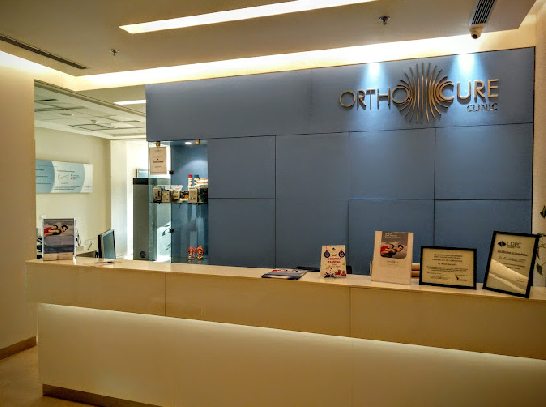Avascular Necrosis, commonly known as AVN, refers to the death of bone tissue due to a lack of blood supply, leading to joint pain and potential complications.
Welcome to YKOrthopaedics.
Consult Dr Yugal Karkhur for AVN Surgery in Gurgaon
or an online consultation

Dr Yugal Karkhur is a pillar in the world of Orthopaedics & joint replacement with over ten years of invaluable service. His academic journey began at Maulana Azad Medical College, New Delhi, progressing to impactful roles at renowned institutions like Lok Nayak Hospital and Sushruta Trauma Centre. Presently, he’s elevating patient care as the Senior Consultant in Orthopaedics and Joint Replacement at Narayana Superspeciality Hospital, Gurugram. Expanding his horizons, he ventured to the Missouri Orthopaedic Institute, USA, for specialized training in joint replacement and Adult hip preservation. His skill set also includes arthroscopic surgeries, a craft honed at Safdarjung Hospital’s Sports Injury Center. Beyond individual care, Dr Yugal collaborates with Gurgaon’s elite medical institutions like CK Birla Hospital and plays an instrumental role as the co-founder of Orthocure Surgery+ at Orthocure Clinics Pvt Ltd. His dedication to research is underscored by 17 peer-reviewed publications and accolades like the Young Ambassador Award from the Asia Pacific Orthopaedic Association in 2016.
Understanding Avascular Necrosis Surgery (AVN Surgery)
Avascular Necrosis Surgery (AVN Surgery) is a medical procedure aimed at treating the bone tissue that has died due to a lack of blood supply. Often arising from fractures or dislocations, this condition can lead to joint pain and arthritis if left untreated. AVN Surgery focuses on restoring blood flow to the affected bone, preventing further bone loss, and facilitating joint function.
- AVN Surgery targets the dead bone tissue.
- The procedure aims to reestablish blood circulation.
- It’s crucial for preventing joint pain and potential arthritis.
- Common causes leading to AVN include fractures and dislocations.
- Untreated AVN can result in severe joint complications.
- The primary goal is to enhance joint longevity and functionality.

Commonly asked Questions Before AVN Surgery
What is AVN
surgery?
When can I walk after surgery?

Can I squat & sit cross legged after surgery?

Can I run and cycle after surgery?
Can it increase my leg length?
Have you been recommended to go in for AVN Surgery?
Get an expert opinion.

Source:- regenorthosport.in
When is Avascular Necrosis Surgery (AVN Surgery) recommended?
Avascular Necrosis Surgery is generally advised when bone tissue death substantially impacts daily activities or threatens the overall health of the joint. A consultation with a specialist becomes imperative for individuals who consistently experience joint pain or limited movement, particularly stemming from injuries or lack of blood supply.
- Persistent joint pain that hinders daily routines.
- Restricted or diminished joint movement.
- Damage resulting from injuries or compromised blood circulation.
- When non-invasive treatments no longer offer satisfactory results.
Advantages Of AVN Surgery

A minimally invasive surgical experience

A faster recovery process

Negligible infection chances

Quick and effective return to daily life activities

Minimal loss of blood
Locations in Gurgaon

Orthocure Clinics
Establishing a unique footprint in India’s medical arena, Orthocure Healthcare stands as the leading chain of clinics solely for orthopaedic issues. Rooted in a commitment to excellence, Orthocure blends top-tier Indian medical knowledge with international perspectives, creating their esteemed “Centres of Excellence” for orthopaedic care. For those choosing Orthocure for their orthopaedic needs, this means cutting-edge treatments, aligned with global standards of best practices. Their dedication to progressive orthopaedic remedies guarantees patients receive personalized, advanced care suited to their specific requirements.

Narayana Superspeciality Hospital
Narayana Superspeciality Hospital is a beacon of medical prowess in Orthopaedics and more. Showcasing global excellence, it consistently aligns with both domestic and international healthcare standards. The hospital’s commitment goes beyond just top-tier medical services—it prioritizes an unmatched patient journey. Narayana promises a modern take on orthopaedic challenges with its advanced infrastructure, featuring state-of-the-art Operation Theatres and Digital X-Ray capabilities. Augmenting this philosophy is their elite team of superspecialists, paired with a caring nursing staff, guaranteeing precise diagnoses and outstanding medical attention for every patient.
FAQ’S
Various factors, including fractures, dislocations, excessive alcohol consumption, prolonged use of high-dose steroid medications, and certain medical conditions, can cause AVN.
AVN is typically diagnosed through physical examinations, patient history, and imaging tests like X-rays, MRI, or bone scans.
Early symptoms may include minor joint pain that intensifies over time, limited range of motion, and discomfort that becomes more pronounced with activity.
No, while both conditions affect the joints, AVN is caused by reduced blood flow to the bone, whereas osteoarthritis is a degenerative joint disease.
Yes, early stages of AVN can sometimes be managed with non-surgical treatments like medications, physical therapy, and lifestyle changes. However, advanced cases might require surgical intervention.
While not all cases are preventable, reducing risk factors like excessive alcohol intake, avoiding prolonged high-dose steroid use, and seeking timely treatment for joint injuries can help.
The progression of AVN varies among individuals. Many can lead a normal life with early detection and appropriate treatment, but in advanced cases, the condition can be chronic.
If left untreated, AVN can lead to severe joint pain, arthritis, and even joint collapse, necessitating joint replacement surgery.
Yes, maintaining a healthy weight, engaging in low-impact exercises, and avoiding activities that strain the affected joint excessively can help manage the condition.

